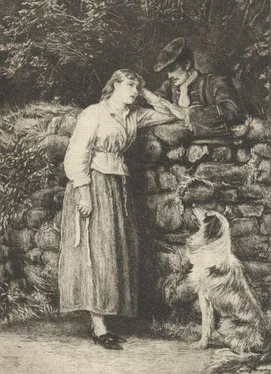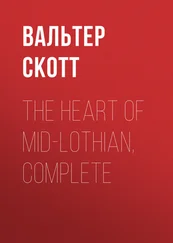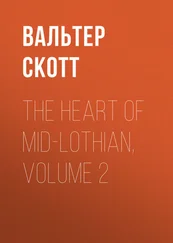Walter Scott - The Heart of Mid-Lothian
Здесь есть возможность читать онлайн «Walter Scott - The Heart of Mid-Lothian» весь текст электронной книги совершенно бесплатно (целиком полную версию без сокращений). В некоторых случаях можно слушать аудио, скачать через торрент в формате fb2 и присутствует краткое содержание. Год выпуска: 2004, Жанр: Исторические приключения, на английском языке. Описание произведения, (предисловие) а так же отзывы посетителей доступны на портале библиотеки ЛибКат.
- Название:The Heart of Mid-Lothian
- Автор:
- Жанр:
- Год:2004
- ISBN:нет данных
- Рейтинг книги:3 / 5. Голосов: 1
-
Избранное:Добавить в избранное
- Отзывы:
-
Ваша оценка:
- 60
- 1
- 2
- 3
- 4
- 5
The Heart of Mid-Lothian: краткое содержание, описание и аннотация
Предлагаем к чтению аннотацию, описание, краткое содержание или предисловие (зависит от того, что написал сам автор книги «The Heart of Mid-Lothian»). Если вы не нашли необходимую информацию о книге — напишите в комментариях, мы постараемся отыскать её.
The Heart of Mid-Lothian — читать онлайн бесплатно полную книгу (весь текст) целиком
Ниже представлен текст книги, разбитый по страницам. Система сохранения места последней прочитанной страницы, позволяет с удобством читать онлайн бесплатно книгу «The Heart of Mid-Lothian», без необходимости каждый раз заново искать на чём Вы остановились. Поставьте закладку, и сможете в любой момент перейти на страницу, на которой закончили чтение.
Интервал:
Закладка:
"'I am the only daughter of a wealthy squire in the north of England, but I loved my father's shepherd, and that has been my ruin; for my father, fearing his family would be disgraced by such an alliance, in a passion mortally wounded my lover with a shot from a pistol. I arrived just in time to receive the last blessing of the dying man, and to close his eyes in death. He bequeathed me his little all, but I only accepted these sheep, to be my sole companions through life, and this hat, this plaid, and this crook, all of which I will carry until I descend into the grave.'
"This is the substance of a ballad, eighty-four lines of which I copied down lately from the recitation of an old woman in this place, who says she has seen it in print, with a plate on the title-page, representing Fannie with her sheep behind her. As this ballad is said to have been written by Lowe, the author of Mary's Dream, I am surprised that it has not been noticed by Cromek in his Remains of Nithsdale and Galloway Song; but he perhaps thought it unworthy of a place in his collection, as there is very little merit in the composition; which want of room prevents me from transcribing at present. But if I thought you had never seen it, I would take an early opportunity of doing so.
"After having made the tour of Galloway in 1769, as Fannie was wandering in the neighbourhood of Moffat, on her way to Edinburgh, where, I am informed, she was likewise well known, Old Charlie, her favourite ram, chanced to break into a kale-yard, which the proprietor observing, let loose a mastiff, that hunted the poor sheep to death. This was a sad misfortune; it seemed to renew all the pangs which she formerly felt on the death of her lover. She would not part from the side of her old friend for several days, and it was with much difficulty she consented to allow him to be buried; but still wishing to pay a tribute to his memory, she covered his grave with moss, and fenced it round with osiers, and annually returned to the same spot, and pulled the weeds from the grave and repaired the fence. This is altogether like a romance; but I believe it is really true that she did so. The grave of Charlie is still held sacred even by the school-boys of the present day in that quarter. It is now, perhaps, the only instance of the law of Kenneth being attended to, which says, 'The grave where anie that is slaine lieth buried, leave untilled for seven years. Repute every grave holie so as thou be well advised, that in no wise with thy feet thou tread upon it.'
"Through the storms of winter, as well as in the milder seasons of the year, she continued her wandering course, nor could she be prevented from doing so, either by entreaty or promise of reward. The late Dr. Fullarton of Rosemount, in the neighbourhood of Ayr, being well acquainted with her father when in England, endeavoured, in a severe season, by every means in his power, to detain her at Rosemount for a few days until the weather should become more mild; but when she found herself rested a little, and saw her sheep fed, she raised her crook, which was the signal she always gave for the sheep to follow her, and off they all marched together.
"But the hour of poor Fannie's dissolution was now at hand, and she seemed anxious to arrive at the spot where she was to terminate her mortal career. She proceeded to Glasgow, and while passing through that city a crowd of idle boys, attracted by her singular appearance, together with the novelty of seeing so many sheep obeying her command, began to ferment her with their pranks, till she became so irritated that she pelted them with bricks and stones, which they returned in such a manner, that she was actually stoned to death between Glasgow and Anderston.
"To the real history of this singular individual credulity has attached several superstitious appendages. It is said that the farmer who was the cause of Charlie's death shortly afterwards drowned himself in a peat-hag; and that the hand with which a butcher in Kilinarnock struck one of the other sheep became powerless, and withered to the very bone. In the summer of 1769, when she was passing by New Cumnock, a young man, whose name was William Forsyth, son of a farmer in the same parish, plagued her so much that she wished he might never see the morn; upon which he went home and hanged himself in his father's barn. And I doubt not that many such stories may yet be remembered in other parts where she had been."
So far Mr. Train. The Author can only add to this narrative that Feckless Fannie and her little flock were well known in the pastoral districts. In attempting to introduce such a character into fiction, the Author felt the risk of encountering a comparison with the Maria of Sterne; and, besides, the mechanism of the story would have been as much retarded by Feckless Fannie's flock as the night march of Don Quixote was delayed by Sancho's tale of the sheep that were ferried over the river.
The Author has only to add, that notwithstanding the preciseness of his friend Mr. Train's statement, there may be some hopes that the outrage on Feckless Fannie and her little flock was not carried to extremity. There is no mention of any trial on account of it, which, had it occurred in the manner stated, would have certainly taken place; and the Author has understood that it was on the Border she was last seen, about the skirts of the Cheviot hills, but without her little flock.
NOTE S.—Death of Francis Gordon.
This exploit seems to have been one in which Patrick Walker prided himself not a little; and there is reason to fear, that that excellent person would have highly resented the attempt to associate another with him in the slaughter of a King's Life-Guardsman. Indeed, he would have had the more right to be offended at losing any share of the glory, since the party against Gordon was already three to one, besides having the advantage of firearms. The manner in which he vindicates his claim to the exploit, without committing himself by a direct statement of it, is not a little amusing. It is as follows:—
"I shall give a brief and true account of that man's death, which I did not design to do while I was upon the stage; I resolve, indeed (if it be the Lord's will), to leave a more full account of that and many other remarkable steps of the Lord's dispensations towards me through my life. It was then commonly said, that Francis Gordon was a volunteer out of wickedness of principles, and could not stay with the troop, but was still raging and ranging to catch hiding suffering people. Meldrum and Airly's troops, lying at Lanark upon the first day of March 1682, Mr. Gordon and another wicked comrade, with their two servants and four horses, came to Kilcaigow, two miles from Lanark, searching for William Caigow and others, under hiding.
"Mr. Gordon, rambling throw the town, offered to abuse the women. At night, they came a mile further to the Easter-Seat, to Robert Muir's, he being also under hiding. Gordon's comrade and the two servants went to bed, but he could sleep none, roaring all night for women. When day came, he took only his sword in his hand, and came to Moss-platt, and some new men (who had been in the fields all night) seeing him, they fled, and he pursued. James Wilson, Thomas Young, and myself, having been in a meeting all night, were lying down in the morning. We were alarmed, thinking there were many more than one; he pursued hard, and overtook us. Thomas Young said, 'Sir, what do ye pursue us for?' He said, 'he was come to send us to hell.' James Wilson said, 'that shall not be, for we will defend ourselves.' He said, 'that either he or we should go to it now.' He run his sword furiously throw James Wilson's coat. James fired upon him, but missed him. All this time he cried, 'Damn his soul!' He got a shot in his head out of a pocket-pistol, rather fit for diverting a boy than killing such a furious, mad, brisk man, which, notwithstanding, killed him dead. The foresaid William Caigow and Robert Muir came to us. We searched him for papers, and found a long scroll of sufferers' names, either to kill or take. I tore it all in pieces. He had also some Popish books and bonds of money, with one dollar, which a poor man took off the ground; all which we put in his pocket again. Thus, he was four miles from Lanark, and near a mile from his comrade, seeking his own death and got it. And for as much as we have been condemned for this, I could never see how any one could condemn us that allows of self-defence, which the laws both of God and nature allow to every creature. For my own part, my heart never smote me for this. When I saw his blood run, I wished that all the blood of the Lord's stated and avowed enemies in Scotland had been in his veins. Having such a clear call and opportunity, I would have rejoiced to have seen it all gone out with a gush. I have many times wondered at the greater part of the indulged, lukewarm ministers and professors in that time, who made more noise of murder, when one of these enemies had been killed even in our own defence, than of twenty of us being murdered by them. None of these men present was challenged for this but myself. Thomas Young thereafter suffered at Mauchline, but was not challenged for this; Robert Muir was banished; James Wilson outlived the persecution; Williarn Caigow died in the Canongate Tolbooth, in the beginning of 1685. Mr. Wodrow is misinformed, who says that he suffered unto death."
Читать дальшеИнтервал:
Закладка:
Похожие книги на «The Heart of Mid-Lothian»
Представляем Вашему вниманию похожие книги на «The Heart of Mid-Lothian» списком для выбора. Мы отобрали схожую по названию и смыслу литературу в надежде предоставить читателям больше вариантов отыскать новые, интересные, ещё непрочитанные произведения.
Обсуждение, отзывы о книге «The Heart of Mid-Lothian» и просто собственные мнения читателей. Оставьте ваши комментарии, напишите, что Вы думаете о произведении, его смысле или главных героях. Укажите что конкретно понравилось, а что нет, и почему Вы так считаете.








